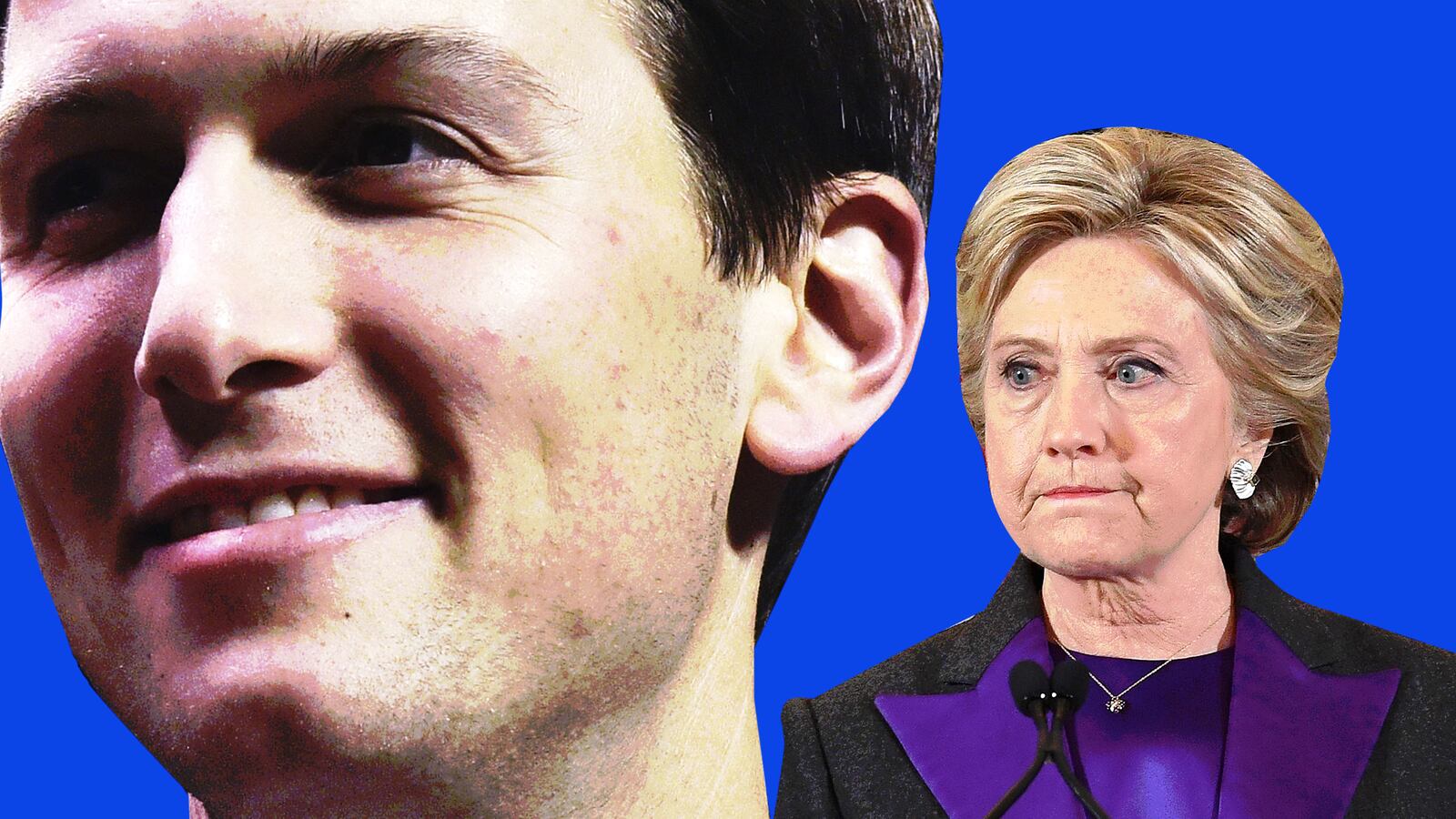President-elect Donald Trump announced on Monday that he is appointing his son-in-law, Jared Kushner, as a senior adviser in the White House. And funnily enough, Trump might have Hillary Clinton to thank for making the position possible.
In 1967, then President Lyndon B. Johnson signed an anti-nepotism bill into law that was widely seen as a reaction to his disapproval of the appointment of Robert Kennedy in John F. Kennedy’s previous administration. The law became an issue once again in 1993 when two federal appeals court judges in Washington, D.C., ruled that the law did not apply to White House staff.
At the time, then President Bill Clinton had appointed his wife, Hillary, to lead health care reform efforts in his administration.
“We doubt that Congress intended to include the White House or the Executive Office of the President” in the statute, D.C. Circuit Judge Laurence Silberman wrote in the decision with Judge Stephen Williams. “So, for example, a President would be barred from appointing his brother as Attorney General, but perhaps not as a White House special assistant.” The judges added that the statute may only bar related individuals from paid positions in government.
Now experts say that ruling may bolster the Trump administration’s position that Kushner’s appointment, which according to the transition team will be an unpaid job, is above board.
“I don’t think the answer is cut and dry on anti-nepotism,” Richard Painter, the former chief ethics lawyer for President George W. Bush, told The Daily Beast in a phone interview. “There’s some room to disagree on that, and I don’t know what the right thing is,” he said, referring to the anti-nepotism statute.
“Two judges didn’t think it applied” in the case of Hillary Clinton, Painter added.
Jonathan Turley, a professor of law at the George Washington University Law School, said the ambiguity of the anti-nepotism law allowed Clinton to retain her position and potentially could green-light Kushner as well.
“I think one has to draw the distinction between actions that are unwise and actions that are unlawful,” Turley said in reference to the Kushner appointment in a phone conversation with The Daily Beast. “The anti-nepotism law has long suffered from a glaring ambiguity.”
The irony is that the term “agency,” as defined in the original 1967 law, has not normally extended to White House staff.
“The White House staff is not ordinarily considered an agency, even though the purpose of the law was to bar federal officials from appointing or promoting their own family members,” Turley said.
As Painter put it, the law creates a scenario where “reasonable people can disagree.”
Silberman, one of the judges who presided over the 1993 case with Clinton, did not immediately respond to a request for comment about the Kushner appointment.
The bigger problem, according to legal experts, is the financial entanglements of Kushner’s empire—which mirrors that of his father-in-law. Kushner’s attorney, Jamie Gorelick of WilmerHale, told Politico that the younger mogul intends to resign from his board positions, trusteeships, and partnerships, and that he intends to file a 278 financial disclosure form, which is required for Cabinet nominees.
The rest of the details of his promised divestitures may be revealed after his father-in-law holds a press conference on Wednesday intended to address his own potential conflicts of interest. Trump’s innumerable global financial ties have prompted a group of Democratic senators including Elizabeth Warren to introduce legislation that would require the president-elect to divest from any problematic financial assets and put the money in a blind trust.
The promise from Kushner’s legal representation is at least giving experts some hope that he will not be encumbered in the White House by legal issues.
“If Kushner takes a White House role, he should submit himself to all ethics, conflicts and disclosure laws,” Norman Eisen, special counsel for ethics and government reform in President Obama’s White House, told The Daily Beast in an email. “His representatives say he will do that. That is a positive step, and I welcome it. That said, we need to see the details of how he will do that. And I hope his father-in-law takes a page from his book and does the same, as presidents have for the past four decades, by divesting into a blind trust or the equivalent.”
But Democrats may have tied their hands on nepotism to an extent after giving Hillary Clinton a pass.
“At the time I was highly critical of President Clinton to [select Hillary to] chair the task force of child health care reform,” Turley said. “It was legally problematic and politically moronic.”
Democrats “will be somewhat hard-pressed to make a convincing case against Trump” given Hillary Clinton’s past position, Turley said. “Hypocrisy obviously flows down Capitol Hill like a powerful river,” he added.
But that doesn’t mean Kushner gets off completely—particularly on divesting from his business interests.
“I don’t know the details of his plan for divestment, as well as stopping certain activities,” Painter said. “It’s going to be very important for the transition team to announce what he’s going to get out of.”
And details don’t always come easily from the Trump transition team.






